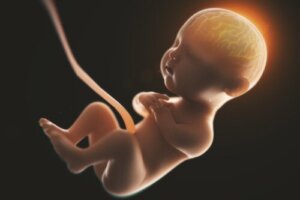Drinking Alcohol During Pregnancy Could Change the Shape of Babies' Brains


Written and verified by the doctor Leonardo Biolatto
Drinking alcohol during pregnancy is a definite no-no for women, amongst other substances. And even though we knew this was a medical recommendation, a new finding shows the early effect that alcoholic beverages could have on fetuses.
Not yet published, but already presented at the annual meeting of the American Society of Radiology, the research led by Gregor Kasprian states that the fetal brain is modified with small amounts of alcohol ingested by the mother. This effect would be evident as early as mid-gestation and would have long-term consequences.
According to this scientist, it isn’t only the biological connotations of this discovery that must be considered. The reality of the availability and accessibility of drugs in certain countries must also be taken into account.
Drinking alcohol during pregnancy isn’t by means unheard of. According to the authors of the study, up to almost 10% of mothers drink alcohol during pregnancy.
What was the new study on alcohol during pregnancy about?
Dr. Kasprian gave details on the modality they used to carry out the research with the fetuses. They used magnetic resonance imaging, as this method doesn’t use harmful radiation.
The study group consisted of 24 fetuses that were between 22 and 36 weeks gestation. Their mothers had a history of some alcohol consumption during pregnancy.
For comparison, MRI scans were also performed on 52 other fetuses whose mothers hadn’t drunk any alcohol. In the group of mothers who did drink alcohol, the average consumption was less than one drink per week.
After the MRI scans were performed, the most notable results were as follows:
- The alcohol-exposed fetuses had a lower maturation score compared to the other group. That is, their brain development in the womb was slower.
- Fetuses exposed to alcohol showed changes in brain structure.
What changes in the brain do fetuses exposed to alcohol have?
According to the report by Dr. Kasprian and his team, the MRI scans showed noticeable changes in the right temporal sulcus of the brain and other parts of the temporal area. This region is associated with social behavior, audiovisual integration, and language development.
From previous research, we know that the temporal lobe plays an important role in processing visual and auditory information. This allows us to enjoy music, dialogue with others, and even regulate emotions.
Although it’s difficult to establish the extent of these fetal brain modifications in adulthood, there are elements to suspect that the influence could extend beyond childhood. Some scientific studies have already reported an association between mothers with alcohol abuse and children who show behavioral problems in adolescence and adulthood.

Other research findings
The MRIs also found an increase in the size of the corpus callosum of the brain and a reduction in the periventricular zone. The corpus callosum is a structure that connects both cerebral hemispheres, while the periventricular zone is the region around the ventricles (these are spaces with cerebrospinal fluid).
The involvement of the corpus callosum would result in a wide range of symptoms. As it’s the area that connects the two hemispheres, problems could be noted in aspects as dissimilar as numerical data processing and personality.
On the other hand, the periventricular area is an area where neurons are born. Experts believe that any reduction in its size would be a sign of reduced production of cells for the brain. This would explain, in part, why fetuses of alcoholic mothers have slower development.
It appears that alcohol exposure during pregnancy places the fetal brain on an altered developmental pathway that differs from the normal pathway.
How much alcohol is harmful in pregnancy?
The strict recommendation is not to consume any alcohol during pregnancy. Many doctors agree on the fact that there’s no safe dose of the substance for pregnant women.
However, some research seems to contradict this and postulates that small amounts would not be enough to cause changes in fetuses. These statements, although validated by scientific research and publications, are nonetheless controversial.
According to Elizabeth Armstrong, there’s no conclusive evidence that occasional alcohol consumption leads to fetal alcohol syndrome. She even insists that strict recommendations for women only generate fear and anxiety, without having a beneficial effect.
A 2012 scientific study also points in the same direction. According to its authors, the children of mothers who consumed small amounts of alcohol didn’t show cognitive deficiencies, at least up to 5 years of age.
Despite this, the U.S. Centers for Disease Control and Prevention (CDC)’s advice is unyielding. There’s no minimum safe amount, they say. The government institution stresses that mothers should not drink any alcohol during pregnancy.
The National Health Service (NHS) in the United Kingdom does not recommend drinking alcohol during pregnancy either. According to their experts, there’s no safe amount in this case and the best attitude would be not to drink any at all, since there isn’t enough evidence to rule out fetal damage.

Read more: The Causes of Alcoholism: Consequences and Treatment
What should I do if I’m pregnant?
If you’re pregnant and ask your doctor about drinking alcohol, they’re likely to tell you not to touch it. That is the most scientifically supported advice, despite any discrepancies there may be with some isolated studies.
The mere possibility of damaging the brain of the baby growing inside you should be enough of a deterrent. If there’s no clearly established safe amount, then the best advice will always be to eliminate it from your life altogether, at least during your pregnancy.
All cited sources were thoroughly reviewed by our team to ensure their quality, reliability, currency, and validity. The bibliography of this article was considered reliable and of academic or scientific accuracy.
- Armstrong EM. Making Sense of Advice About Drinking During Pregnancy: Does Evidence Even Matter? J Perinat Educ. 2017;26(2):65-69. doi: 10.1891/1058-1243.26.2.65. PMID: 30723369; PMCID: PMC6353268.
- Restrepo, Francisco Javier Lopera. “Funciones ejecutivas: aspectos clínicos.” Revista Neuropsicología, Neuropsiquiatría y Neurociencias 8.1 (2008): 59-76.
- Schoeps, Anja, et al. “Prenatal alcohol consumption and infant and child behavior: Evidence from the Growing Up in New Zealand Cohort.” Early human development 123 (2018): 22-29.
- Skogerbø, Å., et al. “The effects of low to moderate alcohol consumption and binge drinking in early pregnancy on executive function in 5‐year‐old children.” BJOG: An International Journal of Obstetrics & Gynaecology 119.10 (2012): 1201-1210.
- NHS. Drinking alcohol while pregnant. 2020. Disponible en: https://www.nhs.uk/pregnancy/keeping-well/drinking-alcohol-while-pregnant/
- Kasprian, Gregor. Stuempflen, Marlene. (2021). MRI Reveals Altered Brain Structure in Fetuses Exposed to Alcohol. Disponible en: https://press.rsna.org/timssnet/media/pressreleases/14_pr_target.cfm?id=2308
This text is provided for informational purposes only and does not replace consultation with a professional. If in doubt, consult your specialist.








